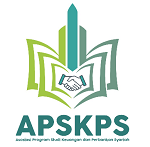Finacial Inclusion Profile In East Java
(1) Universitas Alma Ata
(*) Corresponding Author
Abstract
This study aimed the financial literacy, financial inclusion, and financial technology in East Java Indonesia. Financial inclusion is one of the ways of solving economic problems. Therefore, to out from financial exclusion and enter financial inclusion the people must increase their understanding of financial literacy and try to use financial services. This study will describe financial literacy with two dimensions (knowledge and application dimension), financial inclusion about accessibility in saving and loan and financial technology (receiving money and paying bills). The data used based on the Survey on Financial Inclusion and Access (SOFIA) 2017 with 6.873 respondents. The descriptive analysis was applied as an approach of assessment. Finding on this research revealed that financial literacy, financial inclusion, using financial technology still very low especially in East Java. These results suggest that financial inclusion, financial literacy, and financial technology must be improving through supporting programs so that can parse the economic problems in society.
Full Text:
PDFReferences
Adetunji, O. M., & David-West, A. (2019). The Relative Impact of Income and Financial Literacy on Financial. Journal of International Development.
Asli, Demirguc-Kunt, A., & Klaper, L. (2012). Measuring Financial Inclusion: The Global Findex. World Bank: Working Papper No. 6025.
Bank Indonesia. (2014). Booklet Keuangan Inklusif. Jakarta: Departemen Pengembangan Akses Keuangan dan UMKM Bank Indonesia.
Beck, T., Demirgüç-kunt, A., & Levine, R. (2008). Finance, Inequality and the Poor. Journal of Economic Growth, 27-49.
Davutyan, N., & Öztürkkal, B. (2016). Determinants of Saving-Borrowing Decisions and Financial Inclusion in a High Midle Income Country: The Turkish Case. Emerging Markets Finance and Trade, 2512-2529.
Demirgüç-Kunt, A., Beck, T., & Honohan, P. (2008). Finance For All? Washington DC: World Bank Policy Research Report.
Fauzi, A., & Oxtavianus, A. (2014). The Measurement of Sustainable Development in Indonesia. Jurnal Ekonomi Pembangunan Volume 15, No. 1, 68-83.
Firmansyah, E., & Anwar, M. (2018). Islamic Financial Technology (Fintech) : Its Challanges and Prospect. Harnessing the Power of Frontier Technology to Achieve the Sustainable Development Goals (ASSDG 2018) (p. 52). Atlantis Press.
Gaffney, O. (2014, May 13). Sustainable Development Goals Improving Human and Planetary Well Being. Retrieved July 16, 2019, from Global IGBP (International Geosphere-Biosphere Program) Change: http://www.igbp.net/news/features/features/sustainable developmentgoalsimprovinghumanandplanetarywellbeing.5.62dc35801456272b46d1f7.html
Grohmann, A., Klühs, T., & Menkhoff, L. (2018). Does Financial Literacy Improve Financial Inclusion? Cross Country Evidence. World Development, 84-96.
Gunarsih, T., Sayekti, F., & Dewanti, R. L. (2019). Financial Inclusion and Poverty Alleviation: Evidence From Indonesia. International Journal of Economics, Business and Management Research Vol.2, No.03;2018, 468-480.
Hakeem,Bilal. (2017, September 26). Survey on Financial Inclusion Access Indonesia 2016. Study Documentation Survey on Financial Inclusion Access Indonesia 2016. OXford Policy Management.
Hussaini, U., & Chibuzo, I. C. (2018). The Effects of Financial Inclusion on Poverty Reduction: The Moderating Effects of Microfinance. International Journal of Multidisciplinary Research and Development Volume 5, Issue 12, 188-198.
Huston, S. J. (2010). Measuring Financial Literacy. The Journal of Consumer Affairs Vol.4, No.2, 296-315.
I.V., K., & Y.S, G. (2018). Impact of Financial Techologies on the Banking Sector. FinTech and RegTech: Possibilities, Threats and Risks of Financial Technologies (pp. 215-2016). Knowledge E Engaging Minds.
Lu, L. (2017). Financial Technology and Challenger Banks in the UK: Gap Fillers or Real Challengers? Journal of International Banking Law and Regulation, 273.
Otoritas Jasa Keuangan. (2016). Roadmap Pengembangan Keuangan Syariah Indonesia 2017-2019. Jakarta: Otoritas Jasa Keuangan .
Otoritas Jasa Keuangan. (2017). Strategi Nasional Literasi Keuangan Indonesi (Revisit 2017). Jakarta: Otoritas Jasa Keuangan.
Otoritas Jasa Keuangan. (2017). Survei Nasional Literasi dan Inklusi Keuangan 2016. Jakarta: Departemen Literasi dan Inklusi Keuangan Bidang Edukasi dan Perlindungan Konsumen.
Park, C.-Y., & Mercado, R. (2018). Financial Inclusion, Poverty, and Income Inequality. ADB Economi Working Papper Series No.426, 1-19.
Pemerintah Provinsi Jawa Timur. (2017). Rencana Kerja Pengembangan Daerah. Surabaya: Pemerintah Provinsi Jawa Timur.
Pemerintah Provinsi Jawa Timur. (2019). Pedoman Umum 2019: Jalin Matra Bantuan Rumah Tangga Sangat Miskin. Surabaya: Pemerintah Provinsi Jawa Timur.
Sarma, M. (2012). Index of Financial Inclusion - A Measure of Financial Sector Inclusiveness. Berlin Working Papper on Money, Finance, Trade and Development, 1-37.
Sekaran, U., & Bougie, R. (2013). Research Methods for Business A Skill-Building Approach Sixth Edition. West Susex: John Wiley & Sons.
Umar, A. I. (2017). Index of Syariah Financial Inclusion in Indonesia. Buletin Ekonomi Moneter dan Perbankan, Volume 20, Nomor 1, 99-126.
United Nation. (2016, July). Digital FInancial Incusion. International Telecommunication Union (ITU), Issue Brief Series, Inter-agency Task Force on Financing for Development. Retrieved 08 02, 2019, from United Nation: http://www.un.org/esa/ffd/wp-content/uploads/2016/01/Digital-Financial-Inclusion_ITU_IATF-Issue-Brief.pdf.
United Nations. (2015). Economic and Social Survey of Asia adn the Pacific 2015 - Part I Making Growth More Inclusive for Sustainable Development. Bangkok: United Nations Publication.
Wachira, M. I., & Kihiu, E. N. (2012). Impact of Financial Literacy on Access to Financial Services in Kenya. International Journal of Business and Social Science Vol.3 No.19, 42-50.
World Bank Group. (2019). Global Financial Inclusion (Global Findex) Database. Retrieved July 24, 2019, from The World Bank IBRD-IDA: https://datacatalog.worldbank.org/dataset/global-financial-inclusion-global-findex-database
DOI: 10.24235/amwal.v1i1.6160
Article Metrics
Abstract view : 168 timesPDF - 51 times
Refbacks
- There are currently no refbacks.
Mailing Address
Department of Sharia Banking, Faculty of Islamic Economics and Business, UIN Siber Syekh Nurjati Cirebon
Jl. Perjuangan By Pass Sunyaragi Kesambi Kota Cirebon
E-Mail: journal.alamwal@gmail.com
![]()














